A suggestion that the Royal Pharmaceutical Society should tell civil servants and ministers to butt out, and stop interfering in the future of pharmacy’s professional body, was among a number of forthright comments made by members of the Society who attended a presentation by the Secretary and Registrar, Ann Lewis, before the annual general meeting.
The comment, which was applauded by the meeting, was made by Alan Rogers (Epsom) during discussion after Miss Lewis spoke on the White Paper “Trust, assurance and safety” (PJ, 24 February, p207), taking account also of aspects of the Carter report on pharmacy regulation, which was published only that morning (PJ, 19 May, p573).
When the discussion opened, John Balmford, a past president of the Society, said that the Society had to continue as the body that would carry out the role outlined in the White Paper for the “body akin to a royal college”. It had been a Pharmaceutical Society for over 160 years and should not lose its historic prestige. The public respected it and looked up to it, as Sydney Holloway had pointed out earlier in the evening when receiving his Synergy award (see p628).
Mr Balmford added that the professional body should be for pharmacy graduates and not just pharmacists. It should include those pharmacists no longer registered to practise plus the many outstanding pharmaceutical scientists who were not on the Register because they had not completed preregistration training. But he did not believe that pharmacy technicians should be included.
Answering a question from Peter Jones (Edinburgh), the Secretary and Registrar said that she expected that people appointed to the Society’s new statutory committees would also be included on the panel for the General Pharmaceutical Council. She could see no sense in it starting with a clean white sheet.
Gerald Zeidman (Edgware) said that he was concerned about the set-up costs for the two new bodies. Would they be Government financed or come from the Society?
The President said that the Society had made it clear that it expected the Government to bear the costs.
Mr Zeidman asked what would happen to the assets of the Society.
The Secretary and Registrar said that the assets of the Society belonged to the Society.
A member referred to Lord Carter’s comments that no one body could become the “body akin to a royal college” and asked how the Society saw its role in bringing about that body, given that there were many seats around the table and many leaders outside the Society, all wanting to work together now.
The President said that pharmacists had a unique opportunity to achieve much by working together — and an awful lot to lose if they were divided. “My intention,” he said, “is to make sure that through regular engagement with all the bodies in pharmacy and outside we are able to harness the enthusiasm, the energy and the imagination to create a new vision, where we are able to recognise the diversity in the profession, respect for each sector and support each other, because genuinely I believe that, if we can develop a clinical agenda working in partnership with others, we have a very bright future.”
Mr Rogers said that from the Secretary and Registrar’s presentation it seemed that Government policy had been transparent for 10 years. So why had the Society spent so long struggling to stay as a dual-role body when it could perhaps have been sorting out some of these problems a long time ago?
The Secretary and Registrar replied that Government policy had changed over 10 years. The Government White Paper “A first class service” had positioned self-regulation within the first class service framework of quality. It was the response to Shipman that had changed the picture.
The President said that it was important for all pharmacists working everywhere to focus on what they want out of the new professional body. At present, he did not sense that pharmacists have a clear view about what they want from a professional body. All pharmacists have to ask themselves what they want from their professional body in the future and what commitment they are willing to give. Similarly, they have a right to ask what will they get in return.
The White Paper was based on education and standards, but there was more to a professional body than that — for example, the Society’s benevolent work. The Society could also be proud of its branches, and the President would like to see a much stronger structure supporting pharmacists at a local level. He hoped there would be a robust debate respectful of different views, leading eventually to a common solution that all can sign up to.
Mr Rogers said that the meetings already held had mainly involved relatively small organisations. There had not yet been feedback from the general membership, from community and hospital pharmacists. “You have got to get them on board or there is no future for this organisation,” he suggested. “Much as I respect all the bodies and welcome their involvement, I do not think they can be assumed to be representative of the general pharmacists’ view.”
The President said that the debate about general practice and specialist practice had to go on but taking into account that 75 per cent of practitioners are generalists.
Linda Stone (Solihull), another past president, said that she hoped that discussion on the new professional body people would not focus on what particular factions in pharmacy would want but would reflect on what the whole profession needs for the future, so that future practitioners can go on to develop and deliver the best possible pharmaceutical care to the public and patients.
Nicholas Wood (Chelmsford), also a past president, said that one important point was the need to create a pharmaceutical body that was inclusive. While he had a certain amount of sympathy with Mr Balmford, all those involved in pharmacy one way or another needed to be involved in the new body — not necessarily as full members but perhaps as affiliates or associates.
What was particularly important, said Mr Wood, was to try to create the new body out of a metamorphosis of the Royal Pharmaceutical Society — and it seemed that Lord Carter’s report might help. One crucial requirement was to have the support of community pharmacists. This could be a problem when starting a completely new “body akin to a royal college”, but he believed that with goodwill and hard work community pharmacists would buy into a metamorphosis of the Society into that body. He felt strongly that that was what pharmacists really wanted to do, but nobody should underestimate the challenge.
The President closed the session by re-emphasising the need for pharmacists to go back to basics, focus on what the professional body should do in the future and then work out what structures would support what they wanted. Only then should its name be considered, and the romance of a “Royal College” should not be allowed to guide decisions.
At the end of the AGM, responding to a tribute paid to her as she approaches her retirement, Miss Lewis accused the Government of placing undue pressure on the Society — not over the requirements for regulation but over the functions and structure of the professional organisation that would work with the GPhC. She believed it was a matter for the profession, and that view had been echoed strongly at a meeting of over 100 fellows the previous evening.
The Royal Pharmaceutical Society's official journal


